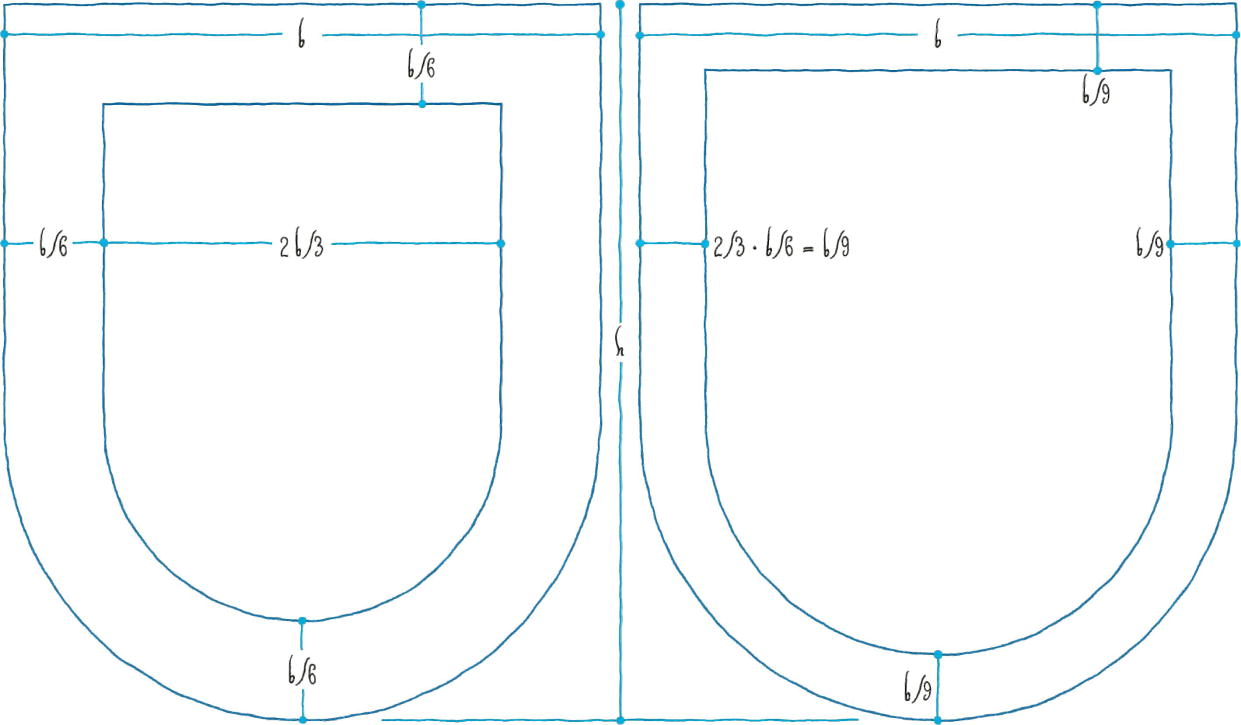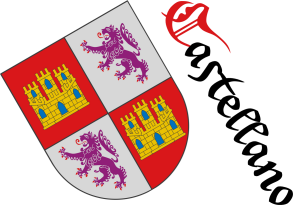
Categories of heraldry
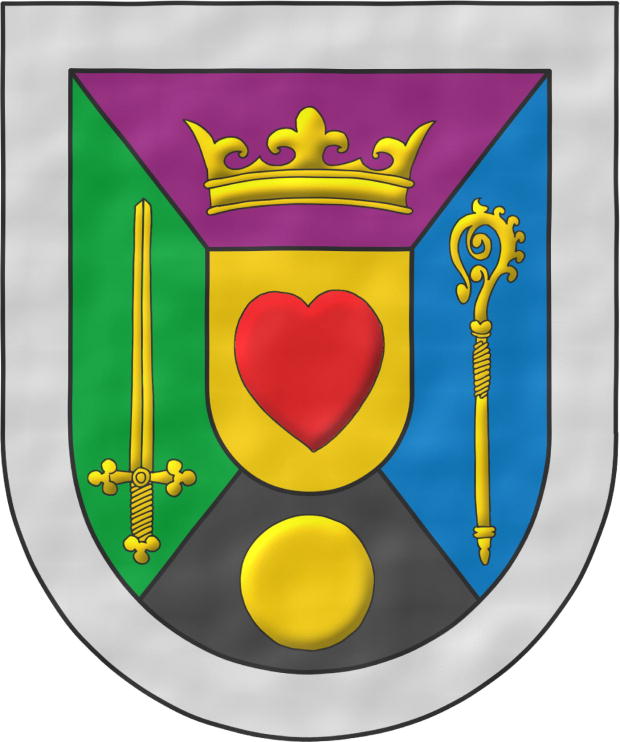
Personal, governance, military, religious, socioeconomic, and, imaginary heraldry.
Quarterly in saltire: 1 Purpure, a crown Or; 2 Vert, a sword point upwards Or; 3 Azure, a crozier Or; 4 Sable, a bezant; an inescutcheon Or charged with a heart Gules; a bordure Argent.
Escudo cuartelado en sotuer: 1o de púrpura, una corona de oro; 2o de sinople, una espada alzada de oro; 3o de azur, un báculo de oro; 4o de sable, un bezante de oro; un escusón de oro cargado de un corazón de gules; una filiera de plata.
Imaginary coat of arms created by me with the following characteristics: its shape is semicircular; its field is enameled with flat tinctures of Purpure, Vert, Azure, Sable, Or, and Argent; all of its figures are illuminated and enameled in Or, except for the heart, which is Gules; and the whole composition has a watercolor finish.
Within the article on my approach to heraldic classification, you can find the symbolism contained within this shield and its category within heraldry.
The original shield design, along with many others, is registered in [Salmerón Cabañas, A.; 2015a; page 30].
All colors and metals
The heraldic colors Gules, Azure, Vert, Sable, and Purpure can be divided into two sets:
- the energetic colors Gules, Azure, and Vert, and
- the neutral colors Sable and Purpure.
Therefore, the Sable-Purpure combination is not the most vibrant.
I use both Sable and Purpure in this design because it incorporates all five colors and both metals, Or and Argent, representing different heraldic disciplines. Note that I have placed Purpure and Sable far apart, precisely due to the initial explanation.
Blazon keywords: Quarterly per saltire, Purpure, Vert, Azure, Sable, Or, Argent, Gules, Crown, Sword, Point upwards, Crozier, Bezant and plate, Inescutcheon and Diminished bordure.
Style keywords: Illuminated, Outlined in sable and Watercolor.
Classification: Created, Imaginary and Coat of arms.
Imaginary bearer: Categories of heraldry.


Categories of heraldry, alternative coat of arms
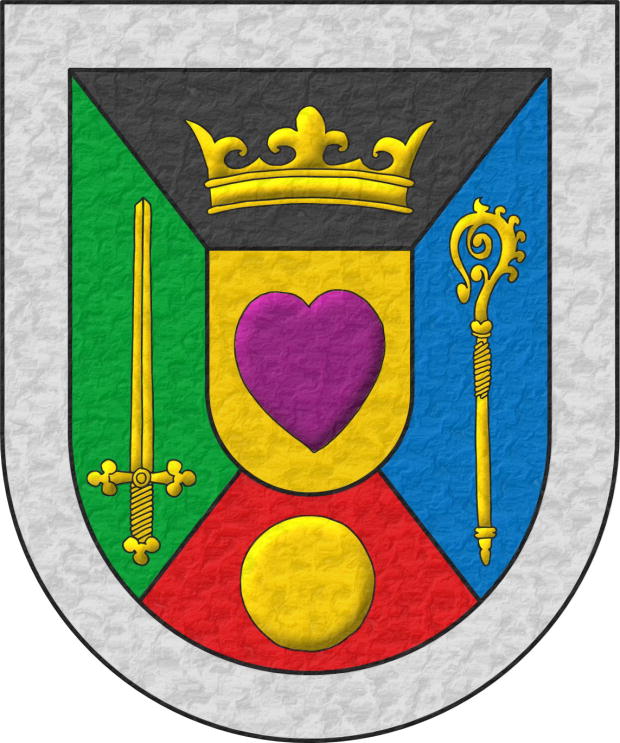
Alternative coat of arms for the heraldry and its categories.
Quarterly in saltire: 1 Purpure, a crown Or; 2 Vert, a sword point upwards Or; 3 Azure, a crozier Or; 4 Sable, a bezant; an inescutcheon Or charged with a heart Gules; a bordure Argent.
Imaginary coat of arms created by me with the following characteristics: its shape is semicircular; its field is enameled with flat tinctures of Purpure, Vert, Azure, Sable, Or, and Argent; all of its figures are illuminated and enameled in Or, except for the heart, which is Gules; and the whole composition has a metallic finish.
These arms are one of the alternatives created during the process of developing a coat of arms for the categories of heraldry.
Blazon keywords: Quarterly per saltire, Purpure, Vert, Azure, Sable, Or, Argent, Gules, Crown, Sword, Point upwards, Crozier, Bezant and plate, Inescutcheon and Diminished bordure.
Style keywords: Illuminated, Outlined in sable and Watercolor.
Classification: Created, Imaginary and Coat of arms.
Imaginary bearer: Categories of heraldry.


Schema of a bordure and a diminished bordure
Proporciones de una bordura y una filiera, una filiera es una bordura con su ancho disminuido en 2/3.
In heraldry, a diminished bordure is a diminished bordure. In the design, it is typically drawn at 2/3 the width of a standard bordure. Since the width of a standard bordure is usually 1/6 of the coat of arms' width, a diminished bordure calculated this way would be 1/9 of the coat of arms' width.
However, diminished bordures can also be found with a width of 1/2 that of a standard bordure, in other words, 1/12 of the coat of arms' width, or 1/3 that of a standard bordure, that is to say, 1/18 of the coat of arms's width.
The so-called bordure of pieces usually has a width of 1/2 that of a standard bordure, which is 1/12 of the coat of arms's width.
Blazon keywords: Without divisions, Bordure and Diminished bordure.
Style keywords: Semi-circular.
Classification: Schema and Coat of arms.
Bearer: Categories of heraldry.


Louis IX of France
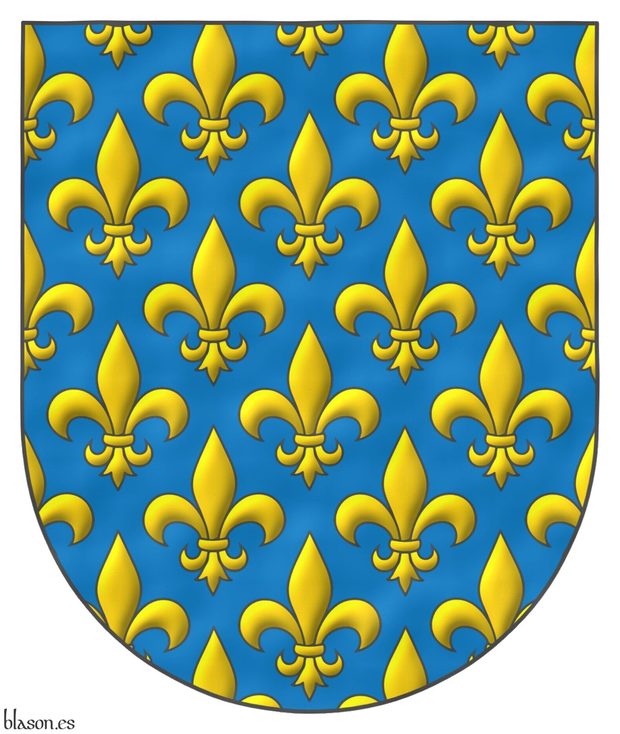
Saint Louis, King of France (1214-1270), son of Blanche of Castile.
Azure semé of fleurs de lis Or.
Escudo de Azur sembrado de flores de lis de oro.
Coat of arms interpreted by me as follows: the shield has a semicircular (round) base; the field is enamelled in flat Azure; the fleurs-de-lis are outlined in Sable and illuminated in Or; and finished with a watercolor effect.
Toward the end of his reign, the armorial called [Wijnbergen; 1265] was created, whose first part is devoted to recording his coat of arms [Wijnbergen; 1265; shield no. 1], which was also that of his father Louis VIII, husband of Blanche of Castile, and the coats of arms of those who were his vassals.
Blazon keywords: Without divisions, Azure, Or, Semé and Fleur de lis.
Style keywords: Semi-circular, Illuminated, Outlined in sable and Watercolor.
Classification: Interpreted, Personal, Coat of arms, Kingdom of France and House of the Capetians.
Bearer: Louis IX of France.


Philip III of France
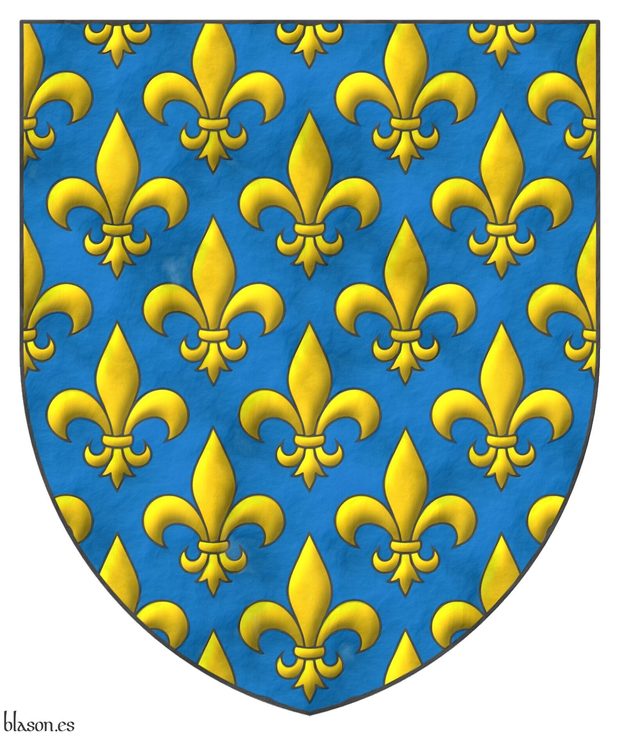
King of France from 1270 to 1285, grandson of Blanche of Castile.
Azure semé of fleurs de lis Or.
Escudo de Azur sembrado de flores de lis de oro.
Coat of arms interpreted with: a pointed base; the field enamelled in flat Azure; the fleurs-de-lis illuminated in Or and outlined in Sable; and finished with a parchment effect.
During his reign, it is believed that the second part of the armorial [Wijnbergen; 1265] was completed, which ends with the coats of arms of several kings, many of them European, beginning this series with the coat of arms of the King of France himself, [Wijnbergen; 1265; shield no. 1,288], which has served as the inspiration for the one recreated here.
Blazon keywords: Without divisions, Azure, Or, Semé and Fleur de lis.
Style keywords: Pointed, Illuminated, Outlined in sable and Parchment.
Classification: Interpreted, Personal, Coat of arms, Kingdom of France and House of the Capetians.
Bearer: Philip III of France.


Charles V of France
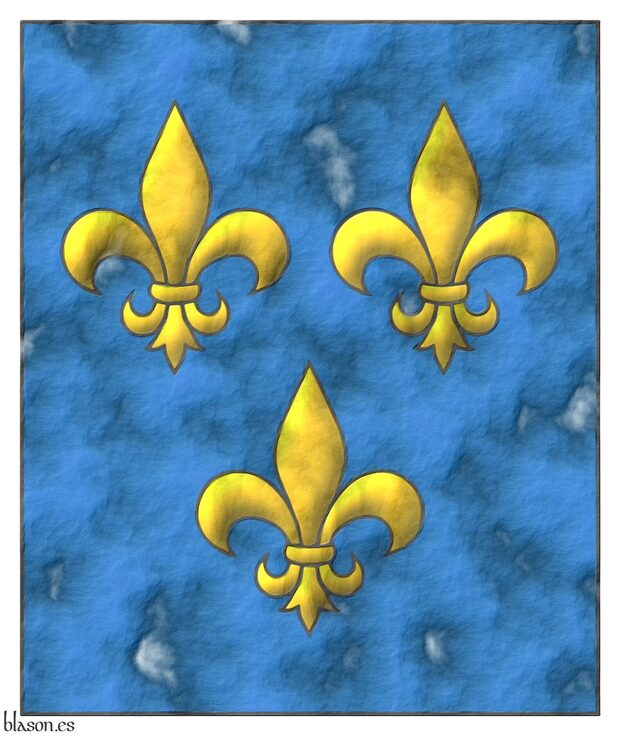
Banner Azure, three fleurs de lis Or.
Pendón de azur, tres flores de lis de oro.
Banner interpreted as follows: rectangular in shape with a 5x6 proportion; the field enamelled in flat Azure; the three fleurs-de-lis illuminated in Or and outlined in Sable; and the whole piece finished with an aged parchment effect.
Starting in 1376, the field sown with fleurs-de-lis was replaced by only three fleurs-de-lis. This change took place during the reign of Charles V of France (1338–1380, King of France from 1364 to 1380).
Edward III Plantagenet (1312–1377, King of England from 1327 to 1377) had incorporated the semé of fleurs-de-lis into his arms as a sign of his claim to the French throne, and Henry IV of England (1367–1413, King of England from 1399 to 1413) again changed the semé into three fleurs-de-lis in his own arms.
These three fleurs-de-lis remained in the royal arms of England until George II (1683–1760, King from 1727 to 1760).
They remained in the royal arms of the French kings until their prohibition during the so-called «Hundred Days», that is, from March 20, 1815, the date of Napoleon’s return to Paris from his exile in Elba, until June 28, 1815, the date of the Second Restoration of Louis XVIII as King of France, when they were reinstated. Finally, after the Revolution of 1830, Louis Philippe I of Orléans decreed their abolition by Order of February 10, 1831.
This banner is a recreation of the one appearing in the armorial [Edward IV of England; 1461; row 23, column 2], although in that armorial the banner seems to be associated with Louis IX of France, perhaps because of the prestige of the saintly King of France, whose arms bore a semé of fleurs-de-lis rather than three.
Blazon keywords: Without divisions, Azure, Or, Three, Fleur de lis and Ordered.
Style keywords: Rectangular, Illuminated, Outlined in sable and Old parchment.
Classification: Interpreted, Personal, Flag, Banner of arms, Kingdom of France and House of Valois.
Bearer: Charles V of France.


Charles VII of France
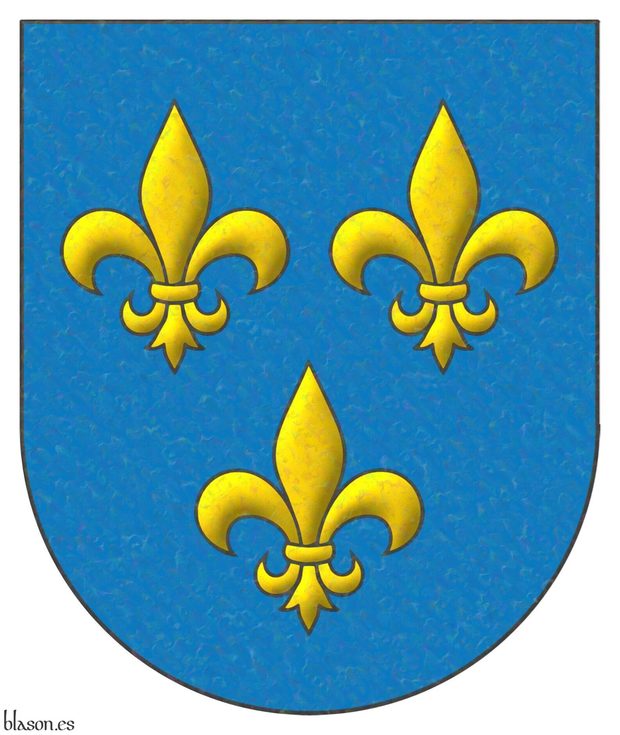
King of France from 1429 to 1461.
Azure, three fleurs de lis Or.
Escudo de azur, tres flores de lis de oro.
Coat of arms interpreted with: a semicircular (round) base; the field enamelled in flat Azure; the fleurs-de-lis illuminated in Or and outlined in Sable; and finished with a mother-of-pearl effect.
This coat of arms is based on the one appearing in the armorial [Ingeram, H.; 1459; page 34, 1st shield], under the inscription «küng von franckrich» (franckrich ~ Frankreich ~ France).
Blazon keywords: Without divisions, Azure, Or, Three, Fleur de lis and Ordered.
Style keywords: Semi-circular, Illuminated, Outlined in sable and Iridescent.
Classification: Interpreted, Personal, Coat of arms, Kingdom of France and House of Valois.
Bearer: Charles VII of France.


Francis I of France
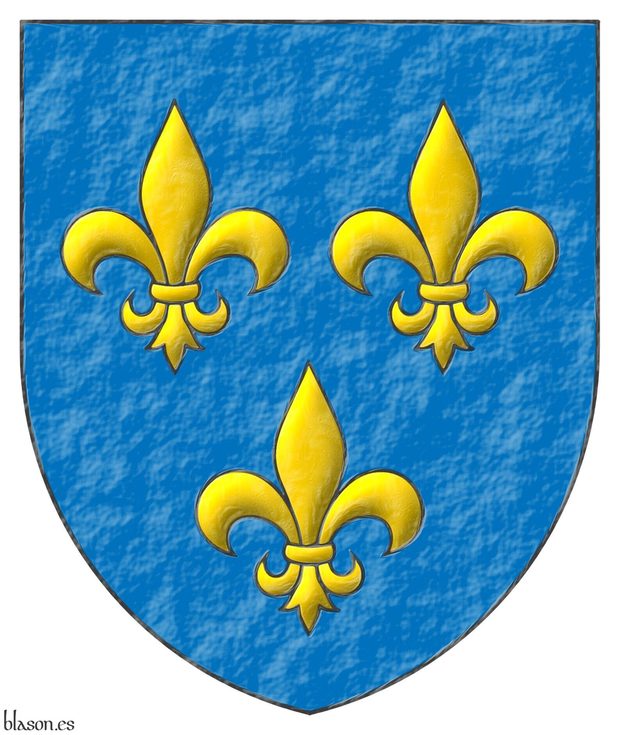
From the House of Valois-Angoulême and with the motto: Nutrisco et extinguo.
Azure, three fleurs de lis Or.
Escudo de azur, tres flores de lis de oro.
Coat of arms interpreted with: a pointed base; the field enamelled in flat Azure; the three fleurs-de-lis outlined in Sable and illuminated in Or; and finished with a plaster texture.
Blazon keywords: Without divisions, Azure, Or, Three, Fleur de lis and Ordered.
Style keywords: Pointed, Illuminated, Outlined in sable and Gesso.
Classification: Interpreted, Personal, Coat of arms, Kingdom of France and House of Valois.
Bearer: Francis I of France.

Continue with: Clermont, Robert of.
-
Language
-
Categories of heraldry
-
Divisions of the field
- Without divisions
- Party per pale
- Party per fess
- Party per bend
- Party per bend sinister
- Tierce
- Tierce sinister
- Tierced per pale
- Tierced per fess
- Tierced per bend
- Tierced pallwise inverted
- Quarterly
- Quarterly per saltire
- Gyronny
- Party per fess, the chief per pale
- Party per pale, the sinister per fess
- Party per fess, the base per pale
- Party per pale, the dexter per fess
- Chapé
- Chaussé
- Embrassé
- Contre-embrassé
- Party per chevron
- Enté
- Enté en point
- Flanched
-
Metals
-
Colours
-
Furs
-
Other tinctures
-
Ordinaries and sub-ordinaries
-
Diminutives of the ordinaries
-
Geometric charges
-
Composite ordinaries
-
Inanimate charges from Nature
Atom, Crescent, Diamond, Emerald, Estoile, Increscent, Lightning flash, Moon, Mount, Mullet, Mullet of four points, Orbital, Plough of Ursa Major, Rainbow, Ray of the sun, River, Sea, Snowflake, Sun, Sun in splendour, Sun of May, Terrestrial globe, Trimount, Water and Wave.
-
Vegetal charges from Nature
Acorn, Apple, Apple tree, Ash, Bluebonnet, Camellia, Chrysanthemum, Cinquefoil, Cornflower, Dogwood flower, Double rose, Eguzki-lore, Elm, Fleur de lis, Flower, Gourd, Holm oak, Hop cone, Indian paintbrush, Kapok tree, Laurel, Lily, Linden, Lotus flower, Madonna lily, Mexican cedar tree, Oak, Olive tree, Palm tree, Plantain plant, Pomegranate, Poplar leaf, Rose, Shamrock, Sunflower, Thistle, Tree, Tulip, Vine and Wheat.
-
Animal charges from Nature
Badger, Bald eagle, Barbel, Barn owl, Bear, Beaver, Bee, Beetle, Bighorn sheep, Binson, Blackbird, Boar, Brach hound, Bull, Cow, Doe, Dog, Dolphin, Dove, Eagle, Elephant, Falcon, Female figure, Fish, Flame, Fly, Fox, Frog, Goat, Goldfinch, Goose, Heron, Horse, Hummingbird, Jaguar, Lark, Leopard, Lion, Lion passant, Lion rampant guardant, Lioness, Lynx, Male figure, Martlet, Merino ram, Owl, Panther, Parrot, Peacock, Pelican, Pelican in her piety, Pronghorn, Puffin, Quetzal, Raven, Roe deer, Rooster, Savage, Seagull, Serpent, She-wolf, Stag, Starling, Talbot, Turtle, Tyger, Vulture, Warren hound and Wolf.
-
Parts of natural charges
Arm, Beak, Branch, Caboshed, Chest, Claw, Covert, Dorsal fin, Eagle claw, Ear of wheat, Ermine spot, Escallop, Feather, Foot (palmiped), Foreleg, Forepaw, Hand, Head, Heart, Hoof, Leaf, Neck, Ostrich feather, Palm frond, Paw, Roe deers' attires, Shoulder, Sprig, Stags' attires, Stem, Swallow-tail, Tail, Tail addorsed, Tail fin, Talon, Tibia, Tooth, Trunk, Trunk (elephant), Two hands clasped, Two wings in vol, Udder, Wing and Wrist.
-
Artificial charges
Ace of spades, Anchor, Anvil, Arch, Arm vambraced, Armillary sphere, Arrow, Axe, Bell, Bell tower, Beret, Bonfire, Book, Bookmark, Bow, Branding iron, Bridge, Broken, Buckle, Cannon, Cannon dismounted, Cannon port, Canopy roof, Carbuncle, Castle, Celtic Trinity knot, Chain, Chess rooks, Church, Clarion, Clay pot, Closed book, Club, Column, Comb, Compass rose, Conductor's baton, Cord, Covered cup, Crozier, Crucible, Cuffed, Cup, Cyclamor, Dagger, Displayed scroll, Double vajra, Drum, Ecclesiastical cap, Fanon, Federschwert, Fleam, Four crescents joined millsailwise, Galician granary, Garb, Gauntlet, Geometric solid, Grenade, Halberd, Hammer, Harp, Host, Hourglass, Key, Key ward, Knight, Knot, Lantern, Letter, Line, Loincloth, Maunch, Menorah, Millrind, Millstone, Millwheel, Monstrance, Mortar, Mullet of six points pierced, Nail, Non-classic artifact, Norman ship, Number, Oar, Oil lamp, Open book, Page, Pair of pliers, Pair of scales, Parchment, Pestle, Piano, Pilgrim's staff, Plough share, Polish winged hussar, Port, Portcullis, Potent, Quill, Ribbon, Rosette of acanthus leaves, Sabre, Sackbut, Sail, Scroll, Scythe, Sheaf of tobacco, Ship, Skirt, Spear, Spear's head, Stairway, Star of David, Step, Sword, Symbol, Tetrahedron, Torch, Tower, Trident, Trumpet, Turret, Two-handed sword, Wagon-wheel, Water-bouget, Wheel, Winnowing fan and With a turret.
-
Immaterial charges
Angel, Archangel, Basilisk, Dragon, Dragon's head, Garuda, Golden fleece, Griffin, Heart enflamed, Justice, Mermaid, Our Lady of Mercy, Ouroboros, Paschal lamb, Pegasus, Phoenix, Sacred Heart of Jesus, Saint George, Sea-griffin, Sea-lion, Trinity, Triton, Unicorn, Winged hand and Wyvern.
-
External elements
-
Heraldic creations
-
References
-
Formats
-
Keywords on this page
Watercolor, Point upwards, Parchment, Old parchment, Pointed, Azure, Bend, Flag, Bezant and plate, Bordure, Crozier, House of Bourbon, House of Valois, House of the Capetians, Categories of heraldry, Charles V of France, Charles VII of France, Clermont, Robert of, Crown, Created, Quarterly per saltire, Outlined in sable, Gesso, Coat of arms, Inescutcheon, Sword, Schema, Diminished bordure, Fleur de lis, Francis I of France, Personal, Gules, Illuminated, Imaginary, Interpreted, Iridescent, Louis IX of France, Semi-circular, Ordered, Or, Banner of arms, Argent, Without divisions, Purpure, Kingdom of France, Sable, Semé, Vert and Three.

